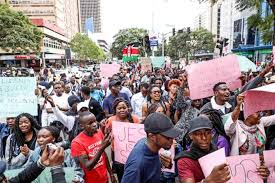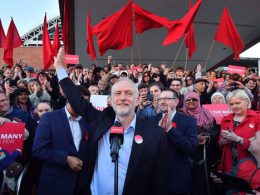By Cathal Curran
For over a month, massive protests have engulfed Kenya, with large demonstrations taking place in 43 out of the 47 counties. In Nairobi, protestors stormed and occupied Parliament and set parts of the building on fire. The state’s response has been deadly. Police have killed over 50 people, shooting and injuring hundreds more. Primarily organised through social media, this eruption is an organic movement from below, spearheaded by the country’s Gen Z youth to such an extent it’s been termed a ‘Gen Z uprising’.
The protests began in opposition to President William Ruto’s annual finance bill, which proposed severe austerity measures, including drastically increased taxes on essential items such as bread, sanitary towels, and fuel.
Explosion of protests
The outrageousness of the bill provoked instant fury. Massive marches began in Nairobi, quickly spreading around the country. The government was initially dismissive of the movement and assumed that because it was youth-dominated, it would soon subside. The parliamentary leader of the ruling party, Kimani Ichung’wah, even went so far as to claim the protests and Gen Z youth consisted of “spoiled and privileged urbanites who know nothing about hardships.”
The median age in Kenya is 19 (Ireland’s is 38), and 70% of people are under 30. Ruto, Ichung’wah, and their ilk quickly changed their tune as the scale of anger became apparent. Ruto withdrew his bill, and when the protests continued, he sacked his entire cabinet, bar one. But these panicked about-faces have not worked, and the struggle continues.
The sustained nature of the movement, which started on June 18th and is ongoing, is a reflection of the increasing resentment levels among young Kenyans over their current conditions and increasingly grim future prospects. Over one-third of the Kenyan population live in poverty, with many more barely above, working multiple jobs to survive. Combined with an extreme cost-of-living crisis, the anger was bubbling under the surface for years – with outbursts over that time occurring more frequently, including prolonged protests against the 2023 finance bill – the newest bill was merely the final straw. This eruption represents a broader rejection of the status quo.
Imperialist exploitation
Kenyans have suffered from the terror of neo-colonial relationships with Western capitalist institutions, like the IMF, for decades, while its ruling class have enriched themselves. Indeed, two weeks before introducing the bill, Ruto met with an IMF delegation. Protestors brandish placards reading “IMF, World Bank, Stop the Modern-Day Slavery” and chant “IMF out”. Since 1975, multiple Kenyan presidents have gone to the IMF for desperately needed funds to keep the state intact through high-interest loans. Countries, including many other African states over that time, that sign up are instructed to implement austerity – cutting public sector pay, halting subsidies and welfare, and privatising public industries and assets. These ‘structural adjustments’ cause immiseration for ordinary people and riches for a few capitalists and provide Western corporations with access to their vast resource wealth.
The IMF claims this is necessary to ‘modernise the economy’ and induce economic growth, despite the fact this has been disproven time and again. For instance, from 1961 to 1981, before the sub-Saharan African debt crisis and ensuing IMF interventions, the region’s GDP per capita grew by 32%. However, from 1981, after the IMF interventions, to 2001, poverty rates nearly doubled. In Kenya, poverty rates rose from 35% in 1973 to 50% by the late 1990s.
Capitalist underdevelopment
Despite this history, it persists due to the lack of alternatives available for developing countries like Kenya and for the benefit provided to the national elite, who are willing participants in implementing austerity and privatisation. Walter Rodney, in “How Europe Underdeveloped Africa,” explains that colonial policies entrenched Africa’s underdevelopment by structuring economies to benefit capitalist and imperialist Europe. Resources were extracted and exported to Europe, stunting local industrial development. Post-independence, neo-colonialism continues this exploitation through international financial institutions and unequal trade relations, keeping African economies dependent on raw material exports and manufactured goods imports by privatising public services and resources, encouraging cheap resource extraction, and hindering value-added manufacturing. But now Kenyan’s youth have said enough.
“Ruto must go” is the cry from the masses, but it’s unclear if even his resignation would stop this uprising. The mood is for actual change, and it’s evident to Kenyans that the political opposition, led by multi-millionaire Raila Odinga, can’t achieve this, mainly after he ended last year’s protests after calls for a national strike started to be made. The leadership of the trade union movement as it currently stands, led by the Central Organization of Trade Unions (COTU), is not offering an alternative and has a foul history of suppressing strikes and protests, including one by 4,000 doctors this year. Even if material improvements for the majority were achieved, there would doubtless be attempts at sabotage by imperialist Western powers and the capitalist system, as we have seen repeatedly.
Youth uprisings in Africa
Recently, across the continent, young Africans have been rising up. From South Africa to Nigeria to Kenya, eruptions of anger have rocked the establishment. Many other countries, such as Mozambique, Senegal, and Ghana, have sustained youth-led movements. The African youth have identified that the current capitalist world order cannot go on, especially with climate change, which is set to hit the poorest hardest, already causing droughts and famines on the continent with worse to come.
The prospect of an organised movement of young, working-class people across the whole continent that renounces the barbaric capitalist system in favour of a socialist one where its wealth is seized and brought into democratic public ownership, benefitting the vast majority of people, terrifies capitalist elites the world over. The youngest continent on the planet will be the first to lose its future. It’s only natural that this is where the fightback begins.












